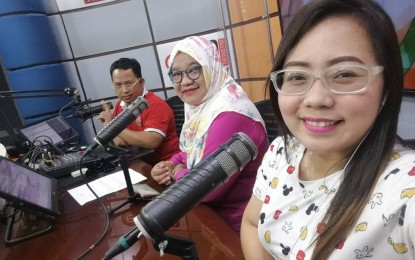
Hadja Sarah Handang (center)
ZAMBOANGA CITY -- Five years after the Zamboanga siege, majority of the displaced residents of the four barangays that comprised ground zero of the crisis are Muslims.
Many of the estimated 10,000 houses that burned down during the attack have not been rebuilt, although the national government has built hundreds of houses for the victim-families.
Muslim women residents have been among who suffered the most, and continue to experience the trauma and economic loss.
To help them, Muslim educator and peace advocate Hadja Sarah Handang and her team of volunteers have been meeting these women in healing and teaching sessions.
They especially engage the mothers, who are currently in Barangay Sta. Barbara, Zamboanga City, where most of the families belong to the low-income bracket.
Handang said they focus on the women's spiritual and psychological well-being to enable them to live normal lives again.
"I see the need to assist the mothers. If the mother is sick spiritually, then her whole family is also sick," she said.
They meet with the mothers in clusters of five or six, in their own houses. She organized four teams composed mostly of madrasah teachers, and hold sessions on weekends.
They use four modules, focusing on topics of women as mother, wife, person and community member. These mothers, Handang said, are stressed out, having been burned out since they are full of household chores.
"They work like slaves," she said. "We relieve them of their anxieties, give them brighter perspectives on their roles and duties. We give them booklets containing prayers with which they can address Allah their supplications."
Because of the Muslim culture, women cannot discuss their problems with their husbands, so the sessions become their "outlet" to release their frustrations.
They also make referrals with government agencies for some practical problems, including lack or absence of utilities or the need for livelihood projects.
Handang is a program coordinator of the Department of Education's Madrasah Education Program in Zamboanga City. She oversees the classroom instruction performance, among other responsibilities, of some 200 madrasah teachers teaching Arabic Language and Islamic Values in some 48 public and private elementary schools.
Handang said she will join a team that will conduct symposiums to combat drug abuse and violent extremism. The participants include Muslim and Christian students aged 13 to 18 years. The teach-ins, she said, will eventually involve a total of 25 schools in the city.
Handang was among those who organized the modules, alongside select officers from the Philippine National Police, non-government organizations, and the Armed Forces of the Philippines.
It is spearheaded by Peace Advocates Zamboanga, with the Asia Foundation as partner.
She will also act as critique in the symposiums. They will tap school teachers to sustain the project, which seeks to teach religious values and prevent distorted interpretations of the Koran, among other topics.
The Silsilah Dialogue Movement, an organization where she is also an active lecturer, will hold a similar symposium in the drug-infested barangay of Recodo in the same city.
The session will engage some 30 adult residents of the community, which has seen rampant violence caused by drug use.
"Drug use and pushing are caused by lack of spiritual values, poverty and delinquency among the youths," she said.
Drug use and proliferation in Zamboanga remain at a high level despite the almost daily police operations in the campaign against drugs. It is reported that most of the “shabu” (crystal meth) come from Malaysia and are shipped aboard commercial vessels that carry rice, where the shabu are hidden among the sacks.
During the Marawi siege last year, an official of a predominantly Muslim barangay reported on the radio that some youths in her community were recruited by the ISIS-Maute for terror training to fight in central Mindanao.
Terrorist violence remains a constant serious threat in Zamboanga, and members of the Abu Sayyaf Group are regularly arrested while moving around the city. (Rey-Luis Banagudos/PNA)
